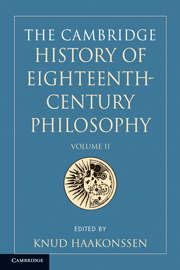Book contents
- Frontmatter
- III Philosophy and Theology
- 21 Natural and Revealed Religion
- 22 Revealed Religion: the Continental European Debate
- 23 Revealed Religion: The British Debate
- 24 Arguments for the Existence of God: The British Debate
- 25 Arguments for the Existence of God: The Continental European Debate
- 26 The Problem of Theodicy
- 27 Religion and Society
- IV Natural Philosophy
- V Moral Philosophy
- Biobibliographical Appendix
- Bibliography
- Index nominum
- Index rerum
- References
21 - Natural and Revealed Religion
from III - Philosophy and Theology
Published online by Cambridge University Press: 28 March 2008
- Frontmatter
- III Philosophy and Theology
- 21 Natural and Revealed Religion
- 22 Revealed Religion: the Continental European Debate
- 23 Revealed Religion: The British Debate
- 24 Arguments for the Existence of God: The British Debate
- 25 Arguments for the Existence of God: The Continental European Debate
- 26 The Problem of Theodicy
- 27 Religion and Society
- IV Natural Philosophy
- V Moral Philosophy
- Biobibliographical Appendix
- Bibliography
- Index nominum
- Index rerum
- References
Summary
The importance of the eighteenth century for interpreting religion is commonly recognised; but how its importance is perceived depends on where one sees its outcome. It was a time of intense disagreement about the nature and worth of religion. A student at Cambridge in the early years of the following century – say, around 1810 – would have been confident that the redoubtable Archdeacon Paley had finally vindicated religion, both natural and revealed, against a hundred years of criticisms. The doors of the church and the academy were still open for business as usual. Today’s admirer of the Enlightenment is more likely to find the representative figure in the sceptical David Hume or the acid Voltaire, their exposure of frail arguments and pious absurdities being taken as the final antidote to conventional religion. Yet others may think that at the end of the eighteenth century the meagre religious insights of the Enlightenment, such as they were, were taken up in various ways into the grander visions of Herder, Goethe, Schleiermacher, and Hegel. Still, there would be general agreement that the eighteenth century raised good questions about religion, whoever is held to have come up with the best answers.
Old theological controversies endured; frequently, they became entangled in domestic politics. But the main interest of the period for religious thought arises out of questions brought to the forum of public debate by the Deists. The participants in the debate, including both the defenders and the critics of religion, held overconfident opinions that time would prove to be much more parochial than they imagined. On all sides, limited perceptions of the essence, benefits, and defects of religion were naively universalised, and obstinate stereotypes of a complex and elusive mode of human behaviour were bequeathed to future generations.
- Type
- Chapter
- Information
- The Cambridge History of Eighteenth-Century Philosophy , pp. 639 - 665Publisher: Cambridge University PressPrint publication year: 2000



